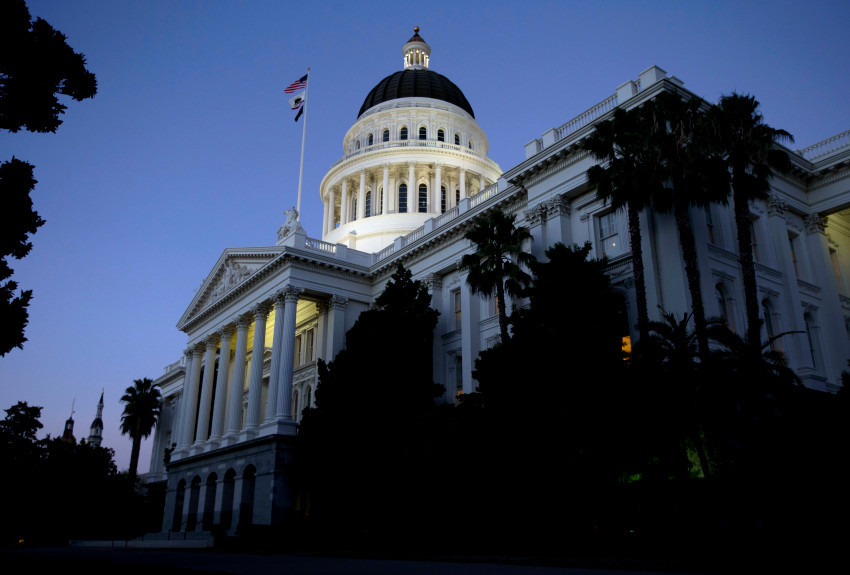A bill signed into law Thursday by Gov. Gavin Newsom will restore benefits that foster care advocates say some youth should have been receiving all along.
The state legislation will ensure foster children whose parents have died receive survivor benefits when they come of age — rather than allowing counties to take those benefits.
San Diego County already decided last year to end its decades-old practice of using Social Security benefits owed to foster children to pay for their care, instead choosing to hold the money in accounts for them until they turn 18.
The newly enacted state legislation requires all counties in California to do similarly starting Jan. 1.
Community leader Shane Harris, a former foster youth himself, had led the local push for the legislation, and for the county to sponsor it.
“This new law restores the rights to foster youths receiving their … benefits instead of counties pocketing that money for an already top-heavy child welfare administration,” he said Tuesday.
Harris and other advocates say the law will help support foster youths, who are at higher risk of falling into poverty and homelessness once they age out of the system. County data show that’s what happens to about a quarter of youths locally within 18 months of leaving foster care.
Counties will now be required to screen all youths for eligibility within two months of entering foster care and to notify recipients when benefits are applied for or received. They must also account for the funds received on a child’s behalf.
Between 40,000 and 80,000 youths in foster care are eligible for or receiving Social Security disability, survivor or other benefits, which can amount to more than $900 per month, according to the University of San Diego’s Children’s Advocacy Institute, which also co-sponsored the bill.
Related Articles
Jury awards California man $33 million, says county failed to report mother’s child neglect
Lawsuits allege years of sexual abuse at a California emergency shelter for kids
Vodka, mental breakdowns, ‘grooming’: South Bay foster teens at group homes describe disturbing life
Santa Clara County to explore new solution to illegally operated group homes for high-risk youth
Before San Diego County halted the practice, it collected and withheld $3.2 million in retirement, survivor and disability insurance payments on behalf of 310 foster youths from 2015 to 2023, according to county records.
“For some of California’s foster children, having access to these previously pilfered assets may be the difference between aging out of care into homelessness or with a roof over their heads,” Amy Harfeld, national policy director at the institute, said in a statement this week.
Even though advocates consider Newsom’s decision last week a “big win,” Harfeld told The San Diego Union-Tribune there is still more work to be done in California — the only state that has made the distinction on which Social Security benefits to protect and left others out, she says.
Harfeld notes that the law does not offer protection for one particularly vulnerable group: disabled foster youths, whose disability benefits can still be taken by the state and used for their care.
“We know these outcomes for these youths are really abysmal when they leave foster care,” Harfeld said. “It’s pennywise and pound-foolish for us to be pilfering their benefits to line city budgets instead of really thinking about what’s best for the child and what would be the best way to help make sure they have a successful future.”
After Newsom vetoed similar legislation last year, citing a budget deficit, Assemblymember Isaac Bryan, another former foster youth, reintroduced a scaled-down version that did not require counties to conserve other types of Social Security benefits, such as those for disabilities.
“We do want to give the governor credit for doing the right thing here in a difficult budget situation, but when you have a population of disabled youth in foster care who are still being policed by the state agency that’s in charge of taking care of them and paying for their care, I don’t know that we can claim that the problem is fixed quite yet,” Harfeld said.
Harris also said the new law misses another key aspect: It does not apply retroactively, so it doesn’t pay foster youths for benefits they would have otherwise received before the county changed its policy.
“We must explore how to actually right the wrongs for those that counties across California stole from while, for no fault of their own, they were in foster care,” Harris said.
USD’s institute has already been pursuing similar concerns locally. It sued the county last year on behalf of two former foster children, saying their benefits were improperly used. That case is ongoing.


